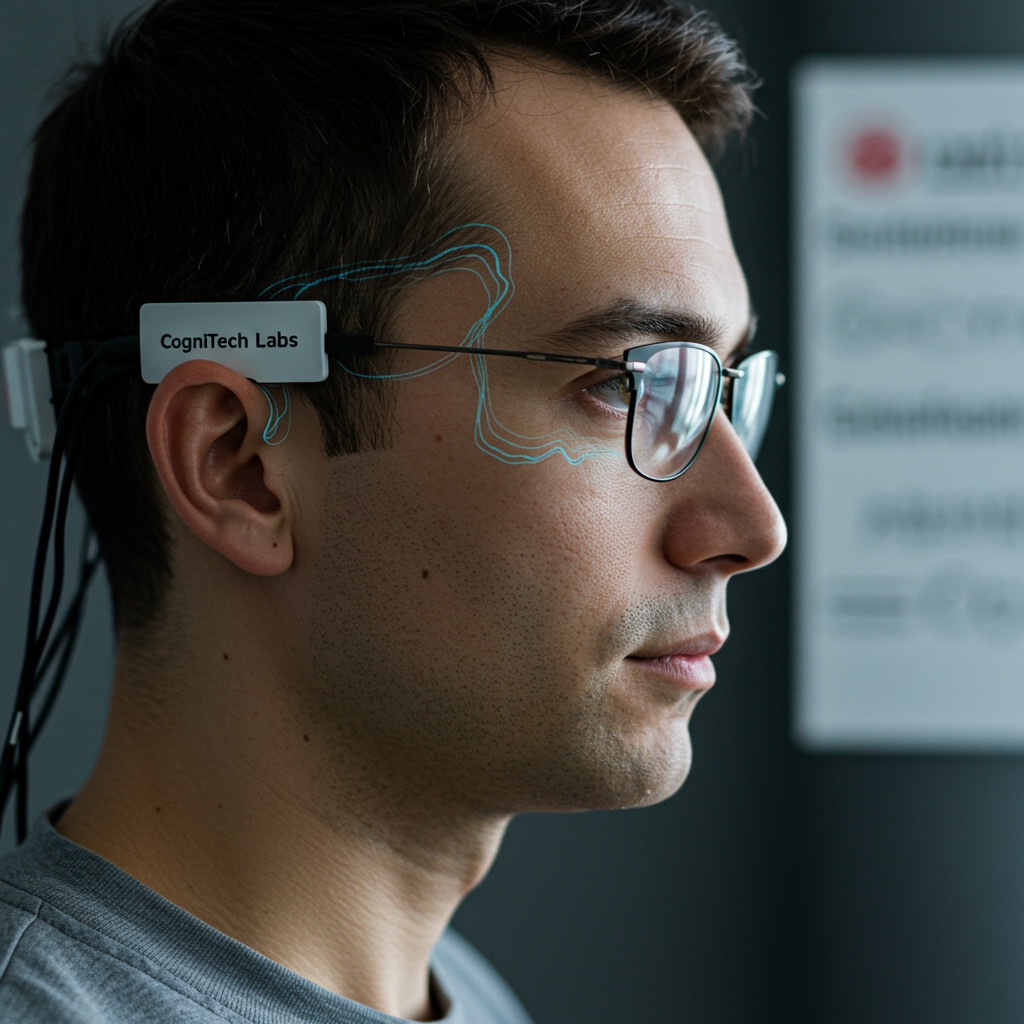CogniTech Labs Unveils Landmark Success in Non-Invasive BCI Clinical Trials
PALO ALTO, CA – CogniTech Labs today announced the successful completion of its Phase 2 human clinical trials for the company’s innovative non-invasive high-bandwidth brain-computer interface (BCI) system. The trials, a significant milestone in the development of BCI technology, were conducted over a rigorous six-month period at the prestigious Stanford University Medical Center, involving a cohort of 50 dedicated participants.
The results revealed during this phase demonstrate remarkable progress towards enabling seamless interaction with digital and physical environments using only neural signals captured externally, without the need for surgical implantation. A key highlight of the trial was the achievement of average typing speeds exceeding an impressive 60 words per minute, a rate comparable to or surpassing typical human typing speeds, all facilitated solely through neural activity interpreted by CogniTech’s external headset.
Beyond communication, the trials also showcased the BCI system’s robust capability in controlling complex robotic prosthetics with significant accuracy. Participants were able to manipulate advanced robotic limbs and devices through directed thought, demonstrating a level of dexterity and control previously largely associated with invasive BCI methods. Furthermore, the technology proved highly effective in navigating sophisticated virtual environments, allowing users to interact and move within digital spaces purely through neural commands.
Advancing BCI Accessibility: The Non-Invasive Advantage
The core innovation lies in the system’s non-invasive nature. Traditional high-bandwidth BCIs often require surgical implantation of electrodes into the brain, a procedure that carries inherent risks and limits widespread adoption. CogniTech Labs’ approach utilizes an external headset design that can capture and interpret nuanced neural signals with a level of fidelity typically associated with invasive techniques.
Achieving high bandwidth non-invasively is a formidable technical challenge. Bandwidth in BCI refers to the amount of information that can be transferred from the brain to an external device per unit of time. Higher bandwidth allows for more precise, faster, and more complex control. The fact that CogniTech’s non-invasive system facilitated average typing speeds over 60 words per minute underscores its high bandwidth capability, a crucial factor for practical, real-world applications, particularly for individuals with severe motor impairments who rely on alternative communication methods.
The trial design at Stanford University Medical Center focused on evaluating both the performance metrics, such as speed and accuracy across different tasks (typing, control, navigation), and the usability and comfort of the external headset over extended periods. The 50 participants represented a diverse group, though specific demographics were not detailed in the initial announcement, ensuring a comprehensive evaluation of the system’s functionality across varied neural profiles.
Paving the Regulatory Path and Future Implications
Building on the success of the Phase 2 trials, CogniTech Labs has taken the crucial step of submitting preliminary data to the U.S. Food and Drug Administration (FDA). This submission marks the beginning of the regulatory process necessary to bring the technology to market. The company is specifically targeting a potential fast-track review by the FDA for certain specific medical applications. This accelerated review pathway is typically granted to therapies or devices that have the potential to address unmet medical needs for serious conditions.
CogniTech Labs anticipates that, subject to regulatory approval, the system could potentially receive fast-track designation and begin to become available for specific medical uses by late 2025. While the initial focus is on medical applications, such as providing communication and control capabilities for individuals with paralysis, ALS, or other severe motor disabilities, the underlying technology holds promise for a much broader range of future applications, including human-computer interaction, gaming, and virtual reality, ultimately aiming to augment human capabilities.
The successful conclusion of these Phase 2 trials and the compelling performance metrics achieved represent a significant step forward for the entire field of BCI. By demonstrating high performance with a non-invasive method, CogniTech Labs is directly addressing the major barrier to widespread adoption – the need for surgery. This development validates the potential of non-invasive BCI technologies to offer practical, accessible, and high-performance solutions, potentially transforming the lives of millions and expanding the reach of BCI far beyond specialized clinical settings and invasive procedures. The path forward involves continued collaboration with regulatory bodies and further refinement of the technology as it progresses towards potential market availability.





